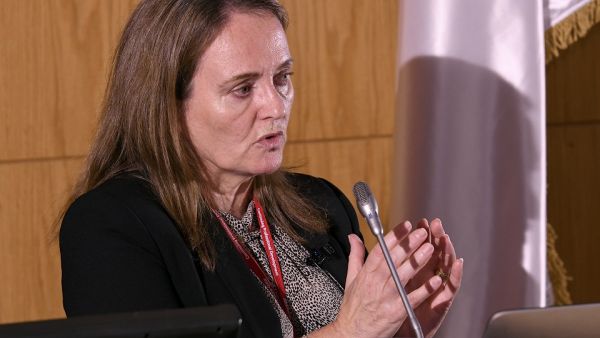Genomic Approaches to Cancer Treatment Discussed at WCM-Q Grand Rounds

The growing role of genomics in cancer treatment was examined at the latest Weill Cornell Medicine-Qatar (WCM-Q) Grand Rounds.
Dr. Susanna El Akiki, consultant clinical scientist in the diagnostic genomic division at Hamad Medical Corporation (HMC), gave a presentation that explained the difference between genetic and genomic analysis, described the technologies used to detect genomic changes, and discussed the impact of genomic reporting on therapeutic decision making. Dr. El Akiki, who is an affiliate faculty member at WCM-Q, also explained how genomics has become central to precision cancer medicine.
Dr. El Akiki said: “What cancers all have in common is that they are due to changes in the genome, to mutations in the DNA, and it’s these mutations that disrupt the regulation of the cell cycle. My role as a diagnostic scientist is to use genetic technologies identify these mutations. We do this to confirm a diagnosis, to determine the prognosis of the patient, to risk stratify for treatment, to measure response to treatment, to monitor disease progression.”
Dr. El Akiki explained that new genetic sequencing technologies allow physicians to look at very large numbers of genes simultaneously, radically enhancing their ability to diagnose, monitor and target treatments at cancers. For example, targeted treatment of chronic myeloid leukemia (CML), a cancer of the white blood cells, with a therapy called tyrosine kinase inhibitors, had led to dramatic improvements in survival rates, she said. Furthermore, by analyzing the mutations in the patient’s genome the physician can make an informed decision about which of the several tyrosine kinase inhibitors would be most effective.
Dr. El Akiki added: “If you look at the key milestones in the treatment of CML over the past 60 years, all of them have been based on our improved understanding of the underlying genomics.
“Genomic medicine is really reshaping the delivery of pathology services as we go into this new era of cancer precision medicine, so it’s a very exciting time and a huge era of change.”
The lecture, titled ‘The Role of Genomics in Cancer Treatment, was accredited locally by the Qatar Council for Healthcare Practitioners-Accreditation Department (QCHP-AD) and internationally by the Accreditation Council for Continuing Medical Education (ACCME).
Background Information
Weill Cornell Medical College in Qatar
Weill Cornell Medicine - Qatar is a partnership between Cornell University and Qatar Foundation. It offers a comprehensive six-year medical program leading to the Cornell University M.D. degree with teaching by Cornell and Weill Cornell faculty and by physicians at Hamad Medical Corporation (HMC), Aspetar Orthopedic and Sports Medicine Hospital, the Primary Health Care Corporation, the Feto Maternal Center, and Sidra Medicine, who hold Weill Cornell appointments. Through its biomedical research program, WCM-Q is building a sustainable research community in Qatar while advancing basic science and clinical research. Through its medical college, WCM-Q seeks to provide the finest education possible for medical students, to improve health care both now and for future generations, and to provide high quality health care to the Qatari population.






